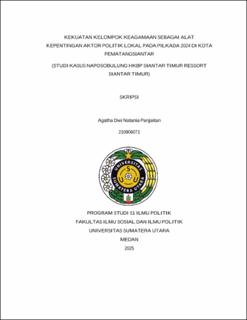Kekuatan Kelompok Keagamaan sebagai Alat Kepentingan Aktor Politik Lokal pada Pilkada 2024 di Kota Pematangsiantar (Studi Kasus Naposobulung HKBP Siantar Timur Ressort Siantar Timur)
The Power of Religious Groups as a Political Tool for Local Actors in the 2024 Regional Election in Pematangsiantar City (A Case Study of Naposobulung HKBP Siantar Timur, Siantar Timur Ressort)

Date
2025Author
Panjaitan, Agatha Dwi Natania
Advisor(s)
Mahrawa, Faisal Andri
Metadata
Show full item recordAbstract
This research examines how the strength of Naposobulung HKBP as a religious
group is used as a tool for interests by local political actors in the 2024
Pematangsiantar City elections. This research aims to describe the mechanisms,
motivations, and impacts of utilizing Naposobulung as a political tool. The
method used is descriptive qualitative with data collection techniques through in
depth interviews, observation, and documentation. The research results show that
local political actors implement various strategies both symbolically and
materially based on the Dalihan na Tolu philosophy to gain moral legitimacy and
cultural solidarity from Naposobulung. Political actors utilize church social
networks, diaconal activities, and community values to build voter loyalty, while
youth groups experience an increase in social roles along with the risk of
religious politicization. However, in the 2024 regional elections, there was a
significant decline in the practical role of Naposobulung due to weak internal
consolidation and the church leaders' stance of limiting political activities,
although the cultural solidarity values based on the Dalihan na Tolu philosophy
were still preserved. The socio-religious potential of this group has not been
completely lost; with the reorganization of functions, strengthening of internal
coordination, and the opening of political dialogue spaces by church leaders,
Naposobulung
can
once
again
support
participatory
democracy.
Recommendations include adapting mobilization strategies, enhancing political
literacy among youth, and formulating internal church policies that balance
religious roles and democratic interests.
Collections
- Undergraduate Theses [1123]
